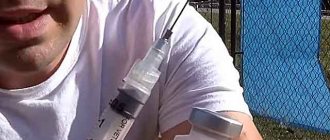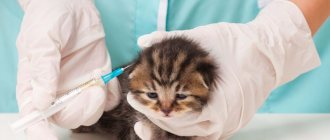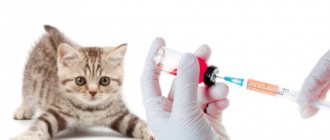Good living conditions and good nutrition are not the key to a cat’s health; the animal also needs to be prevented from diseases. One of the most effective precautions nowadays is cat vaccinations . An animal that does not leave the premises is not completely protected from disease. The infection can also be brought into the house by a person on clothes, shoes, or it can end up in water or food.
Getting vaccinated is an opportunity to protect your cat from a variety of diseases. The vaccination process itself is as follows: a small amount of the pathogen is injected into the cat’s body. As a result, the animal’s body begins to fight and develop a protective system – immunity. Vaccinations for small kittens begin at the age of 8-12 weeks , but only if the animal fed exclusively on mother's milk from the day of birth until this period. If a kitten is picked up from the street, then the first thing to do is contact our veterinarian. In order for specialists to examine the animal, since it may have diseases that require treatment. And only after recovery can the animal be vaccinated .
Why is vaccination needed?
The main purpose of complex vaccinations is for the animal’s body to develop local immunity to a particular virus. A comprehensive vaccination for a cat contains a list of weakened viruses that, when entering the body, provoke a reaction, that is, the production of antibodies.
Thanks to this, even if in the future the animal becomes infected with the virus, it will not get sick, as it will have immunity to the pathogen.
There are two types of vaccination preparations. Serums are prepared using the blood of vaccinated animals. Pathogens in such preparations are neutralized by special substances. Another option for drugs is vaccines, which contain weakened viruses. They cannot cause any harm to the animal’s body, but allow them to develop immunity.
These comprehensive vaccinations only need to be administered once, so the animal is not subjected to unnecessary stress.
When understanding what diseases a comprehensive vaccination for cats is necessary for, it is worth mentioning toxoplasmosis. It is especially dangerous for pregnant women, as it can threaten the death of the fetus.
The cat breed does not affect the choice of complex vaccines for immunization - they are universal. But the exact timing and vaccination schedule is determined by the veterinarian.
This is interesting: Do domestic cats need vaccinations?
Polyvaccines, a comprehensive vaccination for cats
Currently, manufacturers have developed vaccinations against several infectious diseases that are most dangerous for cats:
- panleukopenia,
- rabies
- rhinotracheitis,
- chlamydia,
- infectious peritonitis,
- calciverosis,
- trichophytosis and microsporia (ringworm),
- leukemia.
Polyvaccines have been created against these diseases - complex vaccinations with three or four active components
. Every year, vaccinations for cats are given with such polyvaccines, adding a rabies vaccination to them. The rabies vaccine is used and protects for a longer period - up to three years.
The first comprehensive vaccination for cats: at what age is it carried out?
The first vaccination against panleukopenia, rhinotracheitis and calcivirus is given to a kitten at the age of approximately 8-10 weeks. After 3-4 weeks, revaccination is done with the same vaccine. At the same time, a rabies vaccination is usually given - at three months of age. Vaccinations are then repeated after 12 months.
According to indications, a chlamydia vaccination can be added to the first polyvaccine (at 9-12 weeks).
If there is a high risk of infection with ringworm, then at 8 and 10 weeks they are vaccinated with a live vaccine against this fungal disease.
In disadvantaged areas
for infectious peritonitis, this vaccination is given at four and five months.
If the owners are late in starting vaccinations before changing teeth , you need to wait until this process is completed.
Feline panleukopenia (feline distemper)
The pathogen that causes panleukopenia in cats is similar to that that causes parvovirus enteritis in dogs. Just like in dogs, the gastrointestinal tract and immune system are affected in those who are sick.
For a detailed overview of the course of feline distemper, see this article.
Cats at any age can get sick, but this disease is especially dangerous for kittens, the mortality rate reaches 90%. This is a common disease in markets, those who like to have 20 cats in one apartment, and other places where cats gather.
Treatment is only symptomatic, aimed at combating secondary diseases, with vomiting, with dehydration with the help of droppers, with fasting, if necessary, force feeding.
Diseases for which cats are vaccinated
Every owner of a furry pet should know what vaccinations are given to cats and what diseases they are vaccinated against. Today, animals are most often vaccinated against:
- calcivirosis;
- rhinotracheitis;
- rabies;
- panleukopenia (distemper);
- infectious peritonitis;
- trichophytosis and microsporia (ringworm);
- leukemia (leukemia).
Vaccinations for kittens: what and when to do, at what age
Important! There are no vaccinations for cats against toxoplasmosis (a common disease). Therefore, to prevent your pet from getting sick from it, you should follow the rules of prevention.
Rabies vaccination is mandatory. Vaccination is usually carried out every year. Rabies is dangerous not only for the animal, but also for the owner who comes into contact with it. And you can bring this virus into your home directly on your shoes, on which particles of saliva or feces of a sick animal will remain.
Other diseases, especially viral ones, are also prevented by annual revaccination. Often the composition of the vaccine for cats is combined, so the pet is vaccinated against several diseases at once. This will eliminate a large number of injections, which often frighten the animal.
Diseases for which cats are vaccinated
Note! Today, there are already complex vaccines for cats against rabies with a three-year interval of action (an injection is given once every 3 years).
What are cats vaccinated against?
The list of possible injections differs by region. Depending on the expediency of vaccinations for cats, there are 3 types:
1. Mandatory.
They do not depend on the place of residence and conditions of detention. This group includes the following diseases:
- Rabies
. Rabies vaccination for cats is mandatory not only in Russia, but also in other countries. This dangerous disease affects all parts of the central nervous system and poses a mortal danger to animals and people.
- Panleukopenia (distemper)
. It is difficult to treat in young and elderly animals due to rapid dehydration of the body. Accompanied by fever, damage to the gastrointestinal tract, heart and respiratory organs. Vaccinations against feline panleukopenia reduce the likelihood of infection by up to 10%.
- Calcivirosis
. Causes conjunctivitis and pneumonia, negatively affecting the immune system. As a result of the addition of a secondary infection, the probability of death increases to 80%.
- Rhinotracheitis
. The feline herpes virus affects the upper respiratory tract and causes death in 5-20% of cases.
2. Additional.
This group includes vaccination of cats against specific infections characteristic of certain regions:
- Leukemia
. Recommended for cats taken to the countryside and participating in exhibitions. Refers to cancer diseases that cause the development of lymphosarcoma.
- Chlamydia
. Infection with chlamydia is dangerous not only for the pet, but also for its owner.
- Bordetellosis
. Another disease that affects the upper respiratory tract. Dangerous for homeless animals that go outside freely and for animals kept in crowds.
- Leptospirosis
. Difficult to early diagnosis due to vague symptoms. The main carrier is small rodents.
3. Not recommended.
These vaccines for cats have not yet received convincing scientific evidence. Experimental grafting is typical for the following pathologies:
- Immunodeficiency virus
. Causes acute immunological failure. Characteristic of outbred and older animals.
- Infectious peritonitis (coronavirus infection)
. It is constantly present in the body of 80% of furry pets, but in only 10% it mutates and causes fluid to leak into the abdominal or chest cavity, followed by death.
- Dermatomycosis (ringworm)
. Fungal infection causing itching, hair loss and skin inflammation. Contagious to other pets and people.
Each injection is recorded in a veterinary passport - a cat document necessary for traveling abroad and within the country, participating in exhibitions and official matings. When moving to another country, it is recommended to find out in advance what vaccinations are given to kittens and adult pets for free entry. Less than 1 month should pass from the date of vaccination.
Vaccination calendar for cats
Cats are vaccinated according to the preventive vaccination schedule according to age. Based on individual indications, the veterinarian can adjust the timing of immunization.
Vaccination schedule for cats:
- Panleukopenia, calcivirosis, chlamydia and rhinotracheitis - vaccination at 8 weeks, revaccination at 10-12 weeks and then after 12 months every year.
- Rabies - first vaccination at 12 weeks, revaccination annually.
- Microsporia - vaccination at 8 weeks, revaccination after 2 weeks and then every year.
- Viral peritonitis - first vaccination at 16 weeks, again after 4 weeks. Revaccination annually.
What to vaccinate with?
There are two types of vaccines - “live” and “dead”.
Live vaccines contain a weakened live virus. Live vaccines are prepared from apathogenic pathogens weakened under artificial or natural conditions. Viruses lose their pathogenic properties and lose the ability to cause infectious diseases, but retain the ability to reproduce. An infection artificially caused by the introduction of a vaccine continues for a certain time, is not accompanied by a clinical picture of the disease and stimulates the formation of immunity to pathogenic strains of microorganisms.
Live vaccines create longer-lasting and stronger immunity than inactivated (dead) vaccines.
When using live vaccines, keep the following points in mind:
- Spontaneous mutations. During the multiplication of the virus in the cat’s body, unpredictable changes in the genetic structure and the return of virulence (pathogenicity) of a given microorganism are possible. In this case, the cat will get really sick.
- Coinfection (joint infection) with a “wild” virus. Simultaneous infection with a vaccine virus and a wild one is very dangerous, although unlikely.
- If the cat's immune system is weakened, vaccination may lead to the development of the disease.
Due to the fact that live vaccines are made on the basis of living microorganisms, a number of requirements must be observed to ensure the preservation of the viability of microorganisms:
- live vaccines should be stored and transported at a temperature of 4-8 ° C;
- freezing live vaccines does not affect their properties;
- live vaccines quickly lose their immunogenic properties at room temperature;
- loss of vacuum (violation of the integrity of the ampoules) can lead to the death of the drug.
Inactivated (dead) vaccines contain the entire microorganism that has been killed. Viruses are killed by physical (temperature, radiation, ultraviolet light) or chemical (alcohol, formaldehyde) methods.
For “dead” vaccines, immunity begins to develop immediately after administration, for “live” vaccines - on the 6-7th day: in the first days, viruses actively multiply, and only then an immune response begins to develop.
“Dead” vaccines are not able to multiply in the body: immunity is developed from the small number of killed microbial bodies (or their fragments) that are introduced. In this regard, dead vaccines are safe - they cannot lead to the development of a viral disease. But at the same time they cause less effective and long-lasting immunity.
The safety of dead vaccines can also be questioned: chemicals added to boost immunity can cause serious adverse reactions and complications in the liver and/or kidneys.
The question of the comparative safety and effectiveness of “live” and “dead” vaccines remains open.
The next vaccination is carried out when the kitten is one year old, it includes a comprehensive vaccination and a rabies vaccination. Then every year you need to repeat these two vaccinations without revaccination. In this case, the animal will be protected from all common infections.
- The mandatory list includes vaccines against panleukopenia, calicivirus, rhinotracheitis and rabies. Rabies vaccination is always given separately, other infections are vaccinated with a polyvaccine;
- The list of recommended vaccinations includes the fairly common chlamydia and leukemia.
This is interesting: Vaccinating a cat against distemper
WHEN DO KITTENS GET THE FIRST Vaccination? AT WHAT AGE?
It is recommended to do the first vaccination no earlier than 2 months. At this age, it is quite easily tolerated and well absorbed. If we are talking about professional nurseries that care about the health of babies, then at 3 months they move to a new home. And decent breeders try to fully vaccinate kittens by this age (i.e., at 2 months, the first vaccination, and then again after 21 days). Also, along with revaccination with a complex vaccination, an additional rabies vaccination is often given.
How to prepare a cat, cat, kitten for vaccination
Preparation for vaccination, whether for a kitten or an adult cat, begins with deworming (getting rid of worms).
Deworming
For kittens and adult animals, deworming is carried out with some special features.
Kittens
Exactly 10 days before the first vaccination, we give the kitten an anti-worm tablet/paste/syrup. This is done to develop stronger immunity with the introduction of a vaccine. Most often, preference is given to tablets, since they are easier to get the kitten to eat. You can simply stir it with food or pour it into your mouth. If it is syrup or paste, it is easier to dose (calculated by weight). However, when the kitten realizes that liquid has been forcefully poured into its mouth, it tries with all its might to spit it all out, running around the house, shaking its head and drooling.
It is best to throw your head back and hold it like that for a while.
Before re-vaccination (re-vaccination), it is not necessary to repeat the deworming.
Here are some recommended drugs for worms: Dirofen, Febtal, Panacur, Polyvercan, Profender (single dose), Kanikvantel, Trontsil K, Prazitel, Pirantel (safe drug, does not cause intoxication).
Adult cats and kittens
Before vaccination, adult cats also undergo deworming 10 days before vaccination, regardless of when it was done previously. If the cat has not been vaccinated before, this should be done before the first vaccination. Before re-vaccination (re-vaccination), it is not necessary to repeat the deworming.
Prevention of parasites
It is also advisable to take prophylaxis against parasites (fleas, ticks, etc.) before vaccination (at least a week in advance), since they also weaken the body. Kittens can be washed with a special shampoo, and adult animals can be given drops on the withers (sold at a veterinary pharmacy).
Examination on the day of vaccination
On the day of vaccination, the kitten, cat or female cat must be completely healthy! There should be no signs of lethargy, drowsiness, or poor appetite. Immediately before administering the vaccine, the veterinarian must measure the animal’s temperature (in a healthy state it ranges from 38 to 39 degrees), examine the eyes, nose, mouth, teeth, ears, and mucous membranes for the absence of diseases. The kitten's internal organs are also palpated.
Post-vaccination period
After vaccination, the animal should not be subjected to stress, heavy physical activity, or taken outside the home/apartment. Most likely, immediately after vaccination, kittens and cats will sleep and behave rather sluggishly - this is a normal state. You don’t need to do anything, it goes away within a day, often in a few hours.
The only thing you should do is watch the animal for a while. Unfortunately, isolated cases of anaphylactic shock (allergic reaction) occur, in which the larynx swells and the kitten begins to have difficulty breathing. In this case, contact your veterinarian immediately!
Side effects of vaccines
Unfortunately, cat vaccinations can have side effects. To minimize the risk of their manifestation, be sure to follow the recommendations of veterinarians and choose high-quality drugs for vaccination. Here are the most common side effects.
Fever, lethargy, refusal to eat. Vaccinations are stressful for cats, so if alarming symptoms appear, consult your veterinarian immediately.
An allergy may occur to any component of the medicine. Symptoms of an allergic reaction in a cat: difficulty breathing, salivation, inappropriate behavior. You will notice them within a few minutes after vaccination, so stay with the doctor for a while to make sure that there is no reaction. If an allergy does appear, the veterinarian will immediately prescribe or administer an antihistamine. To prevent a reaction to the drug, you can do allergy tests in advance.
Vaccination of an already infected animal. Diseases have an incubation period during which no symptoms appear. If a vaccine is given at this time, there may be serious consequences for the cat's health or even death of the pet. This rarely happens. To make sure your cat is not sick, quarantine for two weeks before vaccination.
Swelling or redness at the injection site. This is usually a normal reaction and goes away within a few days. But if you have doubts whether everything is okay with your cat, it is better to consult a doctor immediately.
Important: be sure to consult a specialist!
Under no circumstances should you vaccinate yourself. Only a specialist should prescribe the drug and vaccinate. He will examine the cat and prescribe a drug that is suitable for your pet.
This is how we vaccinate:
- The administrator meets you and your pet at the registration desk.
- We issue an electronic outpatient card.
- We conduct a general examination of the cat, measure its body temperature, and weigh it.
- If your pet is clinically healthy and you have no complaints about its general condition, then we inject an anti-allergy drug into the hip. Many breeds are very prone to allergic reactions, despite the "mild" modern vaccines.
- After a couple of minutes, we inject the imported vaccine into the withers area.
- We issue a veterinary passport (new or existing) in accordance with all requirements of the Russian Federation.
Types of vaccines
Immunobiological preparations for vaccination contain inactivated (killed) or modified (live but weakened) viruses. They are not capable of causing disease, but stimulate the production of antibodies to one or another pathological microorganism. Thus, the animal develops immunity to the diseases against which it was vaccinated.
The main advantage of inactivated vaccines over modified ones is greater safety. But preparations containing live microorganisms form a more powerful immune system in the animal.
There are monovalent, bivalent (bivalent) and complex (polyvalent) vaccines. The most commonly used are complex vaccinations that protect animals from several diseases. Such vaccines may include non-viable pathogens:
- Panleukopenia, or feline distemper (Virus panleukopenia feline);
- Rhinotracheitis (Feline alphaherpesvirus);
- Herpesvirus (Herpesviridae);
- Chlamydia (Chlamydia psittaci);
- Calcivirus (Feline calicivirus);
- Rabies (Rabies lyssavirus).
When choosing a vaccine for a cat, the doctor takes into account:
- her age;
- general condition of the body;
- is it planned to obtain offspring from this animal;
- timing of previous vaccinations and their types.
Dead and live vaccines
A live vaccine contains a weakened live virus. After its administration, active reproduction and engraftment of microorganisms begins, subsequently developing stable immunity. A “dead” (inactivated) vaccine contains a killed virus. After entering the cat's body, neither reproduction nor engraftment occurs, so the effect of the drug is less strong.
Sometimes in a vaccine, some of the diseases are represented by live strains of viruses, and some by killed ones.
Note! Dead vaccines are considered safer, but the reliability and duration of immunity in this case is lower. This is why live vaccines are most often preferred.
Dead and live vaccines
Review of popular vaccines:
- nobivac triquet. Complex vaccination for cats against viral rhinotracheitis, calicivirus, panleukopenia;
- nobivac Rabies. From rabies;
- multifel. From viral rhinotracheitis, calicivirus, panleukopenia, chlamydia;
- vakderm. From microsporia, trichophytosis;
- eurifel. From viral leukemia, viral rhinotracheitis, calicivirus, panleukopenia;
- felovax. From viral rhinotracheitis, calicivirus, panleukopenia, chlamydia;
- microderm. From microsporia, trichophytosis;
- felocel. From panleukopenia, calicivirosis, viral rhinotracheitis, chlamydia;
- feligen. From panleukopenia, calicivirus infection, viral rhinotracheitis and rabies;
- chlamycon. From chlamydia;
- rabizin. From rabies;
- quadricate For rabies, panleukopenia, calicivirosis, rhinotracheitis;
- purevax. From panleukopenia, calicivirosis, rhinotracheitis, chlamydia, rabies.
When is it forbidden to vaccinate cats?
Kittens are prohibited from vaccinations at an early age. There is no specific age for vaccination, since veterinarians have different opinions on this matter. Some believe that only three months after birth can you start thinking about vaccination. Undeveloped immunity, strong dependence on mother's milk, and unpreparedness of the lymphatic system are the main arguments against vaccinating young animals. But this is only true for domestic, purebred kittens, born and growing under the supervision of people.
Foundlings who have likely had contact with sick animals need vaccination starting at 2 months of age. In any case, before vaccination, you should examine your pet, and in case of any deviations or health problems, inform your veterinarian. Also, do not violate the age restrictions specified in the vaccination schedule for cats by age.
When is it forbidden to vaccinate cats?
It is prohibited to vaccinate:
- if the cat had contact with sick animals. In this case, you must wait until the incubation period has passed (at least two weeks);
- if the cat's eyes are watery or she starts sneezing. The animal may have a cold, so it is recommended to wait a couple of weeks and only then vaccinate;
- if the cat has fleas or lichen. This applies more to foundlings. Vaccinations for cats are not recommended until fleas are eliminated and skin diseases are cured;
- after surgery. Usually, doctors themselves warn that vaccination cannot be carried out within a month after the operation;
- during pregnancy and lactation in cats.
What vaccinations do kittens get?
Most cat owners are concerned about the question: what vaccinations should a kitten receive and whether they are mandatory.
All cat infections are extremely dangerous and are difficult for animals to tolerate. In 70% of cases, death occurs, so the baby needs to be vaccinated. Moreover, no one knows what the fate of the animal will be. Perhaps one day a pet will escape outside and come into contact with a sick representative of the fauna world.
According to the vaccination schedule, small representatives of the cat family are vaccinated against diseases that pose a serious threat to life and health.
- Leptospirosis. A dangerous infectious disease that threatens a rat-catcher or mouse-catcher, since rodents are the carriers of this infection. Owners whose pets like to walk on their own should pay attention to this disease. Basically, cats carry the infection latently (hidden), so veterinarians detect the disease at the last stage. The main signs of infection are internal and external hemorrhages (nasal/eye), fever.
- Important: Leptospirosis is transmitted to people.
- Herpesvirosis. A viral infection transmitted by airborne droplets. The disease is also popularly called rhinotracheitis. Mostly, kittens up to 7 months old suffer from herpesvirus. The disease manifests itself in the form of conjunctivitis and catarrhal lesions of the upper respiratory tract.
- Calicivirus. A disease similar to the previous one that affects young cats. It affects the respiratory organs. Symptoms include ulcers in the mouth, increased mucus in the nose, and lacrimation.
- Panleukopenia (plague). Kittens are more likely to suffer from this disease than cats. The infection is transmitted through direct contact with infected excrement or the owner's outdoor shoes that have been in plague-infected feces/soil.
Additionally, cats are vaccinated against chlamydia and leukemia if the animal is expected to participate in exhibitions, spend some time outdoors, or have contact with its feline companions.
Without what vaccinations will a cat not be allowed abroad?
Every self-respecting cat or kitten should have a veterinary passport, especially if the owner plans to travel abroad with his pet. Without mandatory vaccinations against rabies, calcivirosis and rhinotracheitis (viral respiratory diseases) and panleukopenia, the animal simply will not be able to pass inspection. Vaccination must be completed at least 30 days, but no more than 11 months before departure.
Note! A vaccination certificate may also be required upon check-in at the hotel.
Without what vaccinations will a cat not be allowed abroad?
Exporting a cat abroad, features of vaccination and paperwork
If the cat owner’s plans include taking the animal outside the country or taking part in exhibitions, it is mandatory, as mentioned above, to obtain an international veterinary passport with notes on vaccination. To transport a cat, a special veterinary form is required (Form No. 1), which is issued based on the passport and vaccinations performed. This form is valid for a short time, only 5 days. Therefore, it is advisable to calculate its receipt and travel time in advance. There are certain nuances for exporting a cat to the countries of the European Union. A special certificate (the result of a blood test for the presence of antibodies to the rabies virus) confirming that the animal has actually been vaccinated against rabies is required. Cat microchipping is also mandatory.
Are there any complications or side effects?
If you follow the instructions and use high-quality drugs, the occurrence of side effects after vaccination is reduced to a minimum (up to 1%). The most common complications are:
- allergy to the components that make up the drug. If there is salivation, difficulty breathing, involuntary defecation, or inappropriate behavioral reactions after vaccination, the animal will most likely need the help of a veterinarian. If over the next 20 minutes. the condition has not stabilized, it is necessary to urgently contact a veterinary clinic;
- when vaccinating an already infected pet (when symptoms have not yet appeared). This happens extremely rarely and can complicate the disease, even leading to death. Before the procedure, you must observe a 2-week quarantine, and also contact a veterinarian for a full examination of the animal;
- redness or a small bump at the injection site. This is a completely normal phenomenon, and owners should not worry about it. After a couple of days, the visible consequences of the injection will disappear without a trace.
Vaccination is an effective and inexpensive method of preventing diseases that are dangerous for cats. Timely vaccination will not only keep your pet healthy, but will also save you from expensive treatment in case of infection.
Where is it better to vaccinate a kitten - at home or in a clinic?
Each cat owner forms the answer to this question for himself due to his financial solvency - some can afford to invite a veterinarian to their home, while others find it easier to take their pet to the clinic. But in any case, the vaccine should only be administered by a qualified doctor.
Advantages of vaccinating a kitten at home:
- you do not transport the animal to the hospital, and as a result, the kitten remains calm at the time of the doctor’s visit;
- the veterinarian has the opportunity to assess the true condition of the pet in its usual environment. When visiting the clinic, the kitten often becomes nervous, anxious, and screams, which interferes with the doctor’s normal work;
- the cat does not have contact with the street and other furry visitors to the veterinary clinic. Due to this, the risk of contracting an infection is significantly reduced;
- you don't waste time going to the hospital.
Advantages of vaccination in the clinic:
- the doctor has at hand all the necessary equipment and tools for a high-quality examination of the animal and vaccination;
- the vaccine is constantly refrigerated before its use, as required by the rules for using the drug. The fact is that the vaccine must be stored and transported only in cold conditions. In case of a home visit, the doctor must bring the drug in a special portable refrigerator;
- if necessary, in a clinic setting, you can immediately carry out any other necessary manipulations, without waiting to visit the hospital. For example, a veterinarian may identify a tick or other problems in a kitten that require immediate attention.
And remember that the veterinarian is the first friend and comrade for your pet after you. He knows exactly how to help a kitten survive the terrible moment of vaccination. For a child, vaccination is stressful, but for an experienced doctor it is a standard procedure, so trust your pet in the hands of a professional and constantly take care of his health. Only in such conditions will the kitten grow up healthy and live a long, happy life, giving you many bright moments!
When is it necessary to get vaccinated?
Experts recommend the first vaccination after the kitten is 8 weeks old. It is at this age that maternal immunity, inherited by the baby from the mother cat, begins to weaken.
A month later, a second vaccination must be carried out, and another one before he reaches the age of 12 months. Up to a year, your pet must be vaccinated three times.
An approximate vaccination schedule for cats looks like this:
| Disease | 1st vaccination | 2nd vaccination | Revaccination |
| Calcivirosis | 9-12 weeks | in 2-4 weeks | annually |
| Ringworm | 8 weeks | 10 weeks | annually |
| Rhinotracheitis | 9-12 weeks | in 2-4 weeks | annually |
| Panleukopenia | 9-12 weeks | in 2-4 weeks | annually |
| Chlamydia | 9-12 weeks | in 2-4 weeks | annually |
| Infectious peritonitis | 16 weeks | 20 weeks | annually |
| Rabies | 12 weeks | every 1-3 years |
Basic rules of vaccination
Rule 1 . If the kitten’s mother cat is vaccinated, then he begins to receive vaccinations at the age of 12 weeks, if not or unknown, then from 8-9 weeks.
Rule 2. When a kitten changes teeth (4-7 months), it is not recommended to vaccinate the animal.
Rule 3. It is not advisable to vaccinate pregnant cats, as this can negatively affect the health of the offspring.
Rule 4. Vaccinations are carried out exclusively for healthy pets. A veterinarian examination is required!
Rule 5. 10 days before vaccination, the cat must be treated for fleas and ticks, and also dewormed.
Rule 6. The vaccine should only be administered by a qualified veterinarian to avoid negative consequences.
Rule 7. After the procedure, the animal’s health must be closely monitored.
Contraindications
Vaccination of cats is carried out only when the animal is completely healthy. There are a number of contraindications that must be taken into account:
- You should not vaccinate a kitten when its teeth change (between 4-8 months);
- elevated temperature;
- physical exhaustion;
- diseases in acute or chronic form;
- the previous injection was given less than three weeks ago;
- helminthic infestation.
You should not take risks and vaccinate if your cat has recently had surgery.
Polyvalent vaccines for cats
The best comprehensive vaccines for cats are:
- Biofel PCH.
, Czech Republic. A vaccine containing inactivated strains of Virus panleukopenia feline, Feline calicivirus and Herpesviridae. The cost of a dose of the drug is about 650 rubles. - Biofel PCHR.
, Czech Republic. Quadrivalent vaccine containing the same inactivated viruses as Biofel PCH plus killed Rabies lyssavirus rabies virus. Price - from 750 rub. - Multifel-4.
, Russia. The four-component vaccine is made from inactivated strains of Virus panleukopenia feline, Feline calicivirus, Feline alphaherpesvirus and Chlamydia psittaci. The cost of a dose of the drug is 340 rubles. - Nobivak Tricat Trio.
Manufacturer: MSD Animal Health, Netherlands. A live vaccine containing attenuated calicivirosis, rhinotracheitis and panleukopenia viruses. One dose of dry preparation with solvent costs about 400 rubles.
Find out more about the Nobivac vaccine for cats
- Quadrocket. , France. The drug contains two vaccines that are mixed during use. These are the dry component “Rabiffa-Feliniffa” (a mixture of attenuated panleukopenia virus and inactivated rabies virus), and the liquid component “Corifelin” (a mixture of inactivated herpes virus with calicivirus antigen). The cost of the “Quadriquet” set is 440 - 460 rubles.
- Felovax. Manufacturer: Fort Dodge, USA. A drug for active immunization of cats against panleukopenia, calicivirus, viral rhinotracheitis and chlamydia. Provides immunity for a year. Price for 1 dose - 150 rubles.
- Eurifel. , France. The drug contains two components: dry - attenuated viruses of panleukopenia and leukemia, liquid - inactivated viruses of rhinotracheitis and calcivirosis.
Vaccinations for cats: pros and cons
Before deciding to vaccinate a domestic cat, the owner can weigh the pros and cons of this procedure.
Benefits of animal immunization:
- The risk of contracting dangerous infections is reduced.
- The immune system is strengthened.
- The risk of infection to people from a sick cat is eliminated.
- After vaccination, the owner does not have to worry about the health of his children and the cat, which often walks outside.
- If the animal does become infected, the disease will be milder and will not cause complications or death.
The disadvantages of vaccinating cats are minor. These include the risks of side effects and complications after vaccination. As a rule, such consequences of animal immunization occur in very rare cases. If you follow all the doctor’s recommendations and select a high-quality vaccine to administer, you can be confident that the preventive procedure is safe for your cat.
What are the dangers of refusing vaccinations?
Vaccinations help cats develop immunity to dangerous infectious diseases. Infection is observed in only 10% of vaccinated people, but even in this case the disease proceeds without complications. In unvaccinated animals the situation is the opposite.
Refusal to vaccinate cats worsens the epidemiological situation in the regions, increasing the frequency of outbreaks of infectious diseases. For an unvaccinated pet, other animals taken for foster care or picked up on the street are dangerous.
Some persistent viruses are carried on outer clothing and shoes. Limiting communication with other animals and keeping them strictly at home does not guarantee complete safety. The only effective way of protection is annual vaccination against the most dangerous infections.
Vaccination of cats to protect against serious diseases. Why does a pet need immunity?
In a cat's environment, especially if it lives in a densely populated city, there are always pathogenic bacteria, viruses and microbes present. They enter the pet’s body from sick cats, birds, and humans. Cats tolerate infection differently: pets with weak immunity may die, but some animals remain healthy, since their body is supported by protective forces that fight the infection.
There is innate and acquired immunity. Innate immunity protects cats from contracting diseases that are not typical for them, such as scarlet fever or cholera. Acquired immunity is most often provided by vaccination of cats. The vaccination will protect the animal’s body for about a year. After this, repeated vaccination will be required.
Acquired immunity will protect the cat from the following infectious diseases:
- Panleukopenia;
- Calicivirus;
- Infectious rhinotracheitis;
- Chlamydia;
- Rabies.
In addition to vaccination against the listed diseases, a cat needs vaccination against the leukemia virus (FeLV), which destroys the bone marrow of kittens and causes cancer. Protection will also be needed against infectious peritonitis (FIP), which causes dropsy in the abdominal cavity or lungs.











